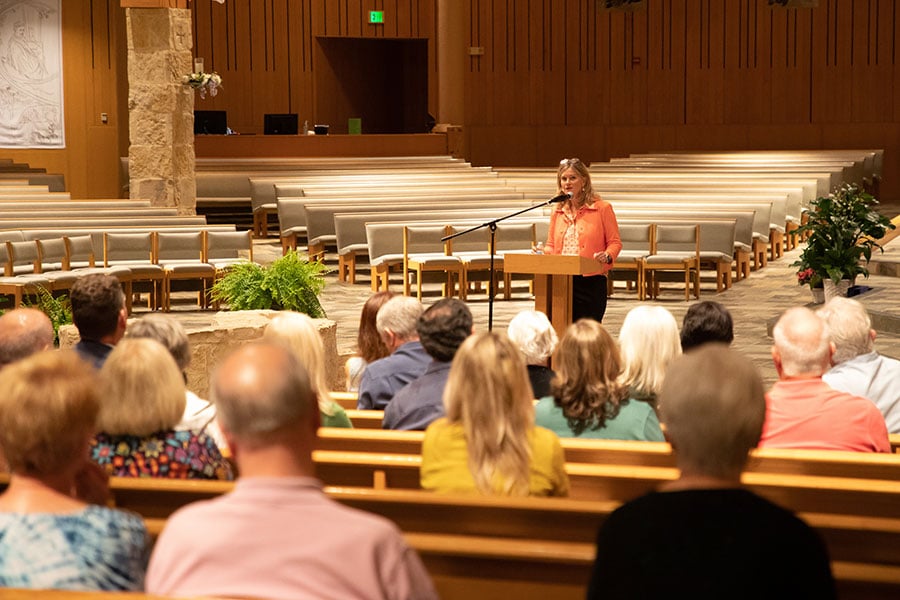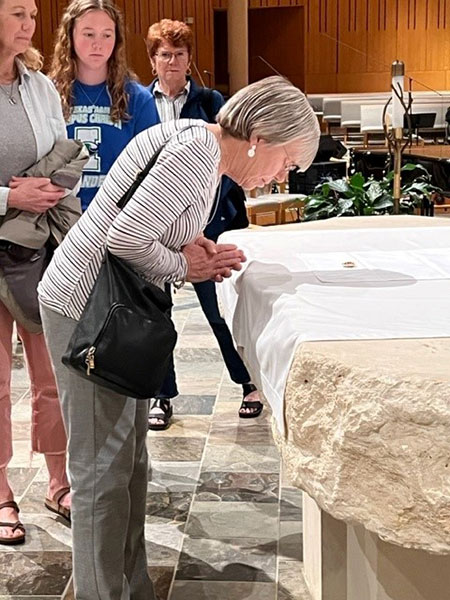“We’re in this for the long game” says National March for Life President

March for Life president, Jeanne Mancini, gives a presentation on life in a post-Roe world at Good Shepherd Parish on May 10, 2023. (NTC/Annette Mendoza-Smith)
COLLEYVILLE — What is the single most important thing a person can do to build a culture of life in a post-Roe v. Wade world? Pray.
That’s the advice Jeanne Mancini gave to supporters who came to Good Shepherd Parish in Colleyville May 10 to hear the veteran pro-life advocate share her thoughts about the advances and challenges facing the movement after the U.S. Supreme Court overturned its 1973 precedent legalizing abortion last June. States now have the right to restrict the procedure.
“Pray every day. Make that a consistent effort,” urged the president of the March for Life Education and Defense Fund. “Take time to meditate and listen to God. If you’re not spending time in prayer every day, it’s impossible to hear the Shepherd’s voice.”
In a society troubled by a loss of morality, division, and an anti-Christian perspective in academia and the entertainment industry, Jesus calls the faithful to be salt and light in the world.
“You were made for such a time as this,” she said, addressing parishioners. “There is a temptation to throw our hands up or bury our heads in the sand, but friends, perhaps now more than ever before, our world needs you.”
Mancini told the North Texas Catholic she went to Mass near the Supreme Court building on the morning of June 24, 2022, and was about to do an interview when co-workers asked her to return to the office because the much-anticipated ruling that could reverse Roe v. Wade was expected.
After reading the outcome of the Dobbs v. Jackson case on her laptop (a decision that effectively eliminated the federal right to abortion), “I was overcome with peace and gratitude. It was a supernatural peace that lasted all weekend long — until it didn’t,” she admitted.
In the weeks that followed, “there were so many threats of violence” as crisis pregnancy centers were vandalized, and protest marches grew more intense.
But there were also high points. A year after Roe v. Wade’s demise, 22 states — Texas included — offered protections for the unborn at some level. Together, these legislative victories will save 200,000 babies from abortion each year and “moms and dads protected from having made a bad choice,” estimated Mancini, adding that’s about one-fifth of the 930,000 abortions reported in the U.S. each year.
In direct opposition are the 28 states with no or few protections for the unborn.
“Some of the more egregious are making their states into places for abortion tourism using taxpayer dollars to do that,” the speaker continued.
A growing challenge are the state ballot initiatives designed to protect the right to abortion. In an August 2022 referendum, voters rejected a “Value Them Both” amendment that would have stripped protections and government funding for abortion from the Kansas Constitution. In November, Michigan voters approved a sweeping amendment to the state’s constitution guaranteeing the right to abortion and other reproductive health services.

“The pro-life movement and public policy advocates are very concerned about these ballot initiatives,” Mancini said, explaining that money often pours in from outside to influence voters. “At the federal level, we also see pro-abortion politicians putting forward bills like the Women’s Health Protection Act that would undo all the work going on in the states.”
Public policy and legislation are critically important in saving lives, but a more important objective is changing hearts and minds, she insisted, adding, “We’re working for the day when abortion is unthinkable.”
It takes a long time to change a society’s view on cultural issues, the former government worker pointed out. The Supreme Court sanctioned racial segregation until the Brown v. Board of Education case in 1954 reversed a prior ruling and another 13 years went by before the Court granted constitutional protection for interracial marriage in its Loving v. Virginia opinion.
“At the time, only four percent of Americans agreed with that decision,” Mancini continued. “We’ve come a long way in terms of understanding human dignity. Cultural change takes time so we’re in this for the long game.”
In addition to prayer and meditation, building a culture of light in the world requires following the promptings of the Holy Spirit, fasting, practicing forgiveness, and being witnesses to the truth.
Publicly witnessing to the truth about abortion and the value of each human person was why the March for Life was founded in 1974 by Catholic convert Nellie Gray. Expecting the Supreme Court to realize its error in deciding Roe v. Wade, the organizer thought the January 22 rally on the Capitol steps would be a one-time event.
Instead, the peaceful march for the unborn has grown during its 50-year history to become the largest annual human rights demonstration worldwide.
“We shut down Washington, D.C., on a Friday every January,” Mancini said before issuing a personal invitation to listeners to join the March for Life next year.
Seeing joy on the faces of the mostly young crowd and the creative signs they make in support of life “changes your heart to be there,” she promised. “In a world where there is so much confusion over what it means to be human and so much disinformation about life, public witness is a breath of fresh air and can change everything.”
After the talk, parishioners were encouraged to venerate a relic of St. Gianna Beretta Molla, patron saint of unborn children, that Mancini carries with her.
Rachel Cummings grew up supporting pro-life issues and attended the 2020 March for Life in Washington.
“I felt so bonded with other young people there,” said the Nolan Catholic High School senior. “You could feel how happy everyone was to be celebrating life.”
The 18-year-old intends to remain true to her convictions when she attends Texas A&M Corpus Christi this fall.
“I hope to build a community of friends that have the same beliefs as me,” she added.
